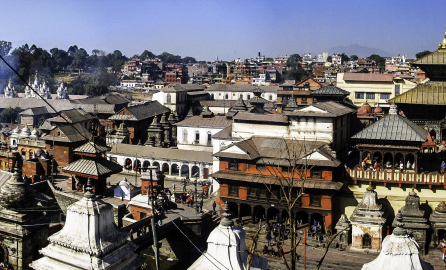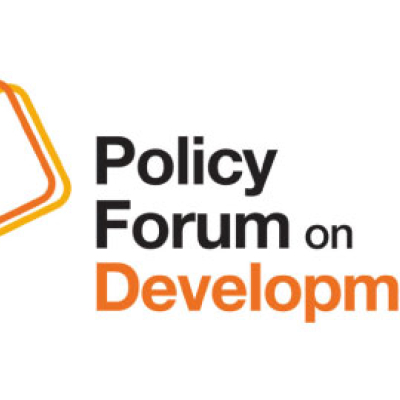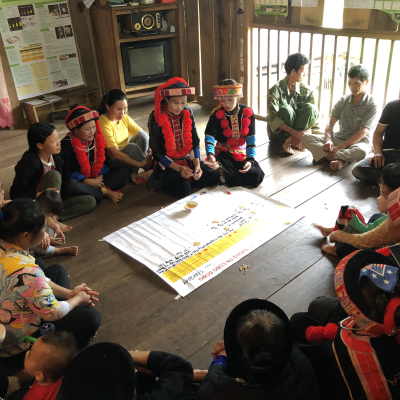More than eighty representatives of Asian civil society organisations, local and national authorities, European Union institutions and Member States gathered in Kathmandu, Nepal from 24 – 26 September 2019 for the 3rd Asia Regional Meeting of the Policy Forum on Development (PFD) to discuss different aspects of the global agenda and the progress made in implementing the Sustainable Development Goals (SDGs).
The meeting looked at cooperation and partnership between the EU and Asia; examined the progress of the 2030 Agenda at regional, national and local level; encouraged debates around the state of an enabling environment; and discussed the specific challenges that climate change brings to the region.
 The PFD was created by the European Commission in 2013 following the Structured Dialogue for an effective partnership in development. It constitutes a space for trust-building and frank exchange in a permanent multi-stakeholder dialogue on development policies, recognising both civil society organisations and local authorities as essential development actors to achieve our shared development goals. Members meet annually in Brussels as well as in one region of the world. This year’s regional meeting focused on Asia.
The PFD was created by the European Commission in 2013 following the Structured Dialogue for an effective partnership in development. It constitutes a space for trust-building and frank exchange in a permanent multi-stakeholder dialogue on development policies, recognising both civil society organisations and local authorities as essential development actors to achieve our shared development goals. Members meet annually in Brussels as well as in one region of the world. This year’s regional meeting focused on Asia.
Since the adoption of the 2030 Agenda, more than 25 countries in the Asia Pacific region have completed at least one Voluntary National Review (VNR) process, showing commitment to the process. The Asia and the Pacific SDG Progress Report for 2019, however, shows that the region is lagging behind on the implementation of most SDGs. Progress has been made in poverty reduction (SDG1) and quality education (SDG4), but the report shows much slower progress in ensuring good health and well-being (SDG3) and achieving gender equality (SDG5). The region is even moving backwards when it comes to ensuring access to clean water and sanitation (SDG6), promoting decent work and economic growth (SDG8) and sustainable consumption (SDG12).
According to the report, an estimated additional $1.5 trillion (€1.34 trillion) per year is needed to meet the SDGs in Asia, but in addition to the financial support, empowerment and inclusion should be fostered.
National implementation of SDGs and Voluntary National Reviews
The report also confirms that almost all Asian countries have shaped some form of national structures in line with the 2030 Agenda and, in one way or another, most have built separate bodies to monitor the SDGs. “Local authorities play a very important role in the localisation of the SDGs as well as other global agendas, climate change agreement and the Sendai Framework for Disaster Risk Reduction,” underlined Bernadia Irawati Tjandradewi, Secretary General, United Cities and Local Governments Asia Pacific. However, only 33% of the VNRs reported by central governments in Asia have consulted local governments even if the number has increased in recent years. This is also due to the fact that the local government associations in some countries are rather passive and are facing a variety of challenges such as a lack of financing and in some cases weak capacities. Some local authorities have tried to resolve this issue by initiating their own Voluntary Local Reviews (VLR) on the status of implementation of the SDGs.
Civil society actors have also actively engaged in the process to monitor and report on the status of the SDG implementation and to hold governments accountable for their global commitments. They also contribute through different initiatives to the implementation of the 2030 Agenda.
Cooperatives are notably working to implement SDGs focusing on poverty reduction (SDG1), hunger eradication (SDG2), gender equality (SDG5), decent work and economic growth (SDG8) and climate action (SDG13). For instance, the International Co-operative Alliance has set up a website dedicated to sharing good practices on 2030 Agenda implementation. In a panel on VNR participation, lessons learned were shared from Indonesia, Mongolia and Cambodia. In Mongolia, the Prime Minister created a multi-stakeholder SDG Committee in order to foster SDG work and dialogue around the country’s VNR process. This served to activate other SDG structures and coalitions amongst CSOs and some have requested it continued to exist.
Systemic barriers
Despite the progress made, speakers mentioned that none of the social sustainable development goals would be collectively achieved by 2030 and that there could even be regression in relation to some of the goals.
A number of systemic barriers were identified and shared among the participants, such as: the availability and reliability of data; lack of political will; weak capacity and technical know-how; inadequate mechanisms, structures to recognise financial opportunities and access available financial resources.
Wardarina, Programme Officer, Asia Pacific Forum on Women, Law and Development, also pointed to inequalities, the climate crisis and the challenge of migration that would make the implementation of some of the SDGs in Asia difficult. Among the most marginalised are women and indigenous people, for example women in Bangladesh “earn during their entire lives less money than a CEO of a company in just four days.” The current economic model excludes many people and increases inequalities.
Recommendations targeting development actors to foster an enabling local environment to overcome the challenges of SDGs implementation included: institutional capacity building for CSOs and LAs; encouraging and supporting national governments in dialoguing with CSOs and local actors, planning and budgeting to include CSOs in national goals; encouraging decentralised and local participation; and developing projects that are need rather than donor-driven.
Civil society shrinking space
An important element that is to be taken into consideration to understand this situation is the CSOs and LAs shrinking space in Asia. According to the CSO Sustainability Index for Asia, only nine countries offer an enabling environment for CSOs to work towards the SDGs. The situation is even severely worsening regarding freedom of expression and association as there have been cases of threat, imprisonment, murder and financial coercion to silence CSOs.
“The PFD is an important platform for CSOs where we can speak freely about the issues and concerns with respect to development policies,” stressed Aaron Ceradoy, Coordinator for Migrants and Diaspora Constituency, CSP Partnership for Development Effectiveness in this respect.
Policy Coherence
One of the strongest messages to the European Union representatives was to tackle the challenge of policy coherence by addressing the current contradictions between economic, trade and investment policies with the 2030 Agenda and human rights policies.
In a final Communiqué, the participants declared: “We welcome and acknowledge the value of the Regional PFD Meeting in bringing us together to constructively engage with one another. (…) The PFD looks forward to see Asia as an equal partner to the EU in the successful implementation of the SDGs by 2030. CSOs and LAs will continue to collaborate among each other and with the EU in cooperation with regional bodies and in pursuit of genuine SDG implementation in the region towards development justice.”
Additional information:
- Event page of the Asia Regional Meeting including the final communiqué and the PFD in brief.





Log in with your EU Login account to post or comment on the platform.